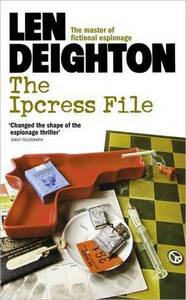Take a photo of a barcode or cover
adventurous
challenging
dark
mysterious
tense
medium-paced
Plot or Character Driven:
Plot
Strong character development:
Yes
Loveable characters:
Yes
Diverse cast of characters:
No
Flaws of characters a main focus:
No
Imagine a writer who is a cross between PG Wodehouse and John Le Carrè. Now imagine that's he is high while writing a book. You get Len Deighton. This is my third book by Deighton and I still don't get him. The storyline lacks coherency and random stuff just keeps happening. Finally when we do get an explanation, it leaves you feeling unsatisfied. The wit in the lines are a plus point, however incongruous it may be.
This is supposed to be masterpiece in the spy thriller genre but somehow it did not meet expectations for me.
This is supposed to be masterpiece in the spy thriller genre but somehow it did not meet expectations for me.
Very entertaining spy story, a real slice of 60s cold-war paranoia. The plot is a bit fantastic, but the writing is excellent and carries the reader along.
Enjoyed the film a few short years ago, but the book has dated badly.
adventurous
mysterious
tense
medium-paced
3.5 to 4 stars. (Enjoyed it less on the second read but only a little less).
Comes across as a little too cool for its own good, but still good stuff and I can appreciate that at the time of publication it would have been very cool.
Comes across as a little too cool for its own good, but still good stuff and I can appreciate that at the time of publication it would have been very cool.
I'll admit that I felt dumb for the first two thirds of the book. Things happened to the narrator/protagonist, weren't explained and I had no idea what was going on. It felt like a series of disjointed vignettes.
It started to click in the last third and there was a lengthy and fairly clunky explanation at the end that cleared everything up.
I understand that the reader is only getting what the narrator knows and the narrator definitely doesn't know everything. I just don't think it worked all that well.
It started to click in the last third and there was a lengthy and fairly clunky explanation at the end that cleared everything up.
I understand that the reader is only getting what the narrator knows and the narrator definitely doesn't know everything. I just don't think it worked all that well.
I've been meaning to read Len Deighton for years, and finally got around to it. Cold war era espionage is appealing, and I had heard good things (it was a best seller, led to a a film adaptation in 1965, and started a very long writing career). His debut novel has its moments, but overall I think it's a slightly flawed. It's a pretty straightforward plot, but numerous times I found myself saying "What just happened?" Deighton seemed to gloss over some major plot points, and twice I consulted an on-line synopsis of the novel to get me back on track. Maybe we can chalk it up to a first time writer, so I'll give him the benefit of the doubt and read the next book. But beware of some vague explanations and abrupt (confusing) transitions.
The mood is certainly Cold War era and very British, and I liked that, even though I was occasionally lost with his extremely British references. There have been comparisons to Ian Fleming, but after this first one, I feel Fleming is a better writer, despite his dips into racism and sexism (both generally absent Deighton's writing). The unnamed protagonist here is the anti-Bond, being somewhat bookish and self-conscious. He's a secret agent in an realistic, analytical way, and is perhaps a more realistic example of British "Intelligence" than the suave, international 007. There's an element of bureaucratic muddling and squabbling that is absent from the Bond novels. On the other hand, I feel like Fleming's novels have more universal appeal, while the Ipcress File may have delighted the Brits a little more than everyone else, if that makes any sense. I'll read on see what comes next.
The mood is certainly Cold War era and very British, and I liked that, even though I was occasionally lost with his extremely British references. There have been comparisons to Ian Fleming, but after this first one, I feel Fleming is a better writer, despite his dips into racism and sexism (both generally absent Deighton's writing). The unnamed protagonist here is the anti-Bond, being somewhat bookish and self-conscious. He's a secret agent in an realistic, analytical way, and is perhaps a more realistic example of British "Intelligence" than the suave, international 007. There's an element of bureaucratic muddling and squabbling that is absent from the Bond novels. On the other hand, I feel like Fleming's novels have more universal appeal, while the Ipcress File may have delighted the Brits a little more than everyone else, if that makes any sense. I'll read on see what comes next.
The plot is overly-complicated, but interactions between characters shine. The book has a fun Raymond Chandler meets John Le Carré energy. It doesn't really hang together on the espionage front, but it's a fun ride even so.



